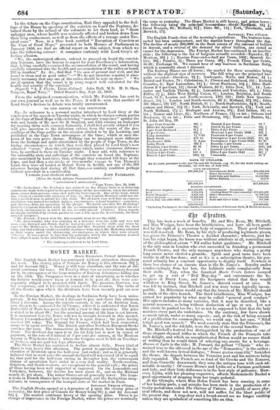‘64t ihratrro.
This has been a week of benefits. Mr. and Mrs. Kean, Mr. Mitchell, and Miss Woolgar, have been the beneficiaires, and have all been grati- fied by the sight of a numerous body of supporters. Their good fortune was well deserved. Mr. Kean, by his style of producing legitimate pieces, has given the Princess's Theatre a decided character; whereas, just be- fore his reign began, the house was without attribute at all, reminding one of the philosophical axiom "Nil nullas habet qualitates." Mr. Mitchell is the only man in London who ever succeeded in founding a permanent French Theatre, and the only manager anywhere who during a pretty long career never elicited a grumble. Spirit and good taste have been visible in all he has done ; and as his is a subscription theatre, his per- sonal urbanity has a constant opportunity to display itself. Nowhere is there less chance of an emeute than in the St. James's. Royalty smiles condescendingly from her box, the habitués smile complacently from their stalls. Nay, when the fanatical Monte Cristo rioters essayed to get up a sort of "Evil May-day" and exterminate the fo- reigners at Drury Lane, and the foreigners stated that they would withdraw to King Street, St. James's, discord ceased at once. It was felt by instinct, that Mitchell and war were terms logically incom- patible. An Hibernian would say that the laurels of Mr. Mitchell should be made of the olive branch. The third beneficiaire, Miss Woolgar, has earned her popularity by what may be called "general good conduct." Her sphere includes so many varieties, that it may be described, like a general massacre, as being without distinction of age or sex. Let not this simile be pushed too tar; let us not be supposed to hint that the lady murders every part she undertakes. On the contrary, few have shown so much talent, under so many aspects ; and, at the risk of being accused of a predilection for commonplaces we would say, in her case " Nihil tetigrt quod non ornavit." We need scarcely state that the Princess's, the St. James's, and the Adelphi, were the sites of the several benefits. Mr. Mitchell's festival was distinguished by the production of one of those elegant rhymed trifles in which the French of the Francais take such delight, and which an unsophisticated Briton would no sooner think of writing than he would think of selecting eau sucree for a beverage. Horace et Lydie is the title; M. Ponsard, the gallant "Classic" who re- mained true to the old creed in the age of the "Romantics," is the author ; and the well-known lyrical dialogue, "Donee gratus cram tibi," furnishes the theme, the dispute between the Venusian poet and his mistress being duly expanded. The French are so fond of the Greeks and the Romans, and from Corneille downwards they miss the antique tone with such ad- mirable dexterity ! Of course Horace and Lydia are a Parisian gentleman and lady, and their little difference lain the best style of gallantry. How- ever, Lydia, with her pleasing coquetries, affords Mademoiselle Rachel a good opportunity of stepping from her tragic pedestal. At the Olympic, where Miss Helen Faucit has been starring in some of her leading parts, a sad mistake has been made in the production of a trashy melodrama called The Ch4teau of Valenza. A jumble of mere phy- sical effects, and these not new, will not suffice for the blase public of the present day. A trap-door and a broad-sword are no longer exciting unless they are symbolical of something like an idea. •


























 Previous page
Previous page